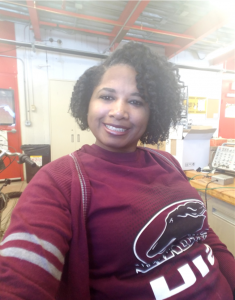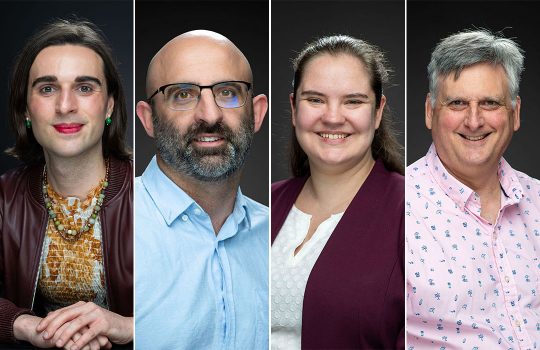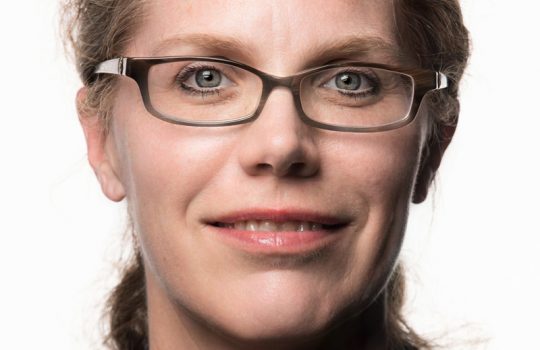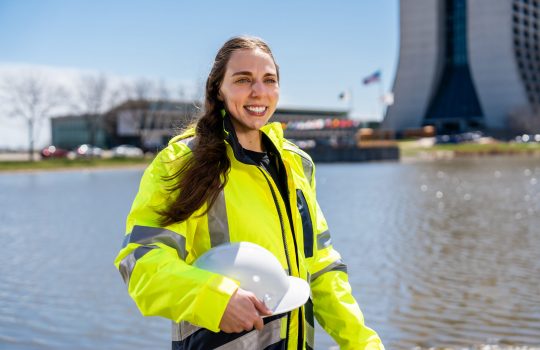
Roshanda Spillers makes sure that the experiments’ electronics are in working order and that the accelerators are well-maintained. Photo courtesy of Roshanda Spillers
How did you end up working at Fermilab?
I started working at the lab in January of 1998, soon after I had graduated from college with an associate’s degree in electronics and a bachelor’s of science in electrical engineering technology. I didn’t know anything about Fermilab back then, but I knew I wanted to work with electronics, so I put in an application on a whim and have been here ever since. It’s been over 20 years now.
What does a typical workday look like for you?
As an electronics technician in the Accelerator Division, I am part of the team responsible for making sure that the power supplies are operational for the different types of experiments done around the lab. I test various electronics, like transformers, voltage regulators, and circuit boards, to ensure there are no issues or glitches. My group functions sort of like a fire department in a way — we’re here on-call to troubleshoot whenever something goes wrong.
We also work on improving equipment currently in use by the particle accelerators. During beam shutdown periods, I’m mostly busy with maintenance work that keeps things running smoothly. But when the beam is turned on, we’ll work on further developing accelerator technologies by building new machinery that will get installed during the next shutdown.
What is the most rewarding part of working at Fermilab?
The best part is that I am able to supplement my on-the-job experience with educational opportunities. Fermilab has an excellent tuition assistance program that I use to enhance the work I do in my current position. Since working here, I have earned additional bachelor’s degrees in information technology and technical resource management, as well as an associate’s degree in computer support.
So you hold five degrees in total — that’s impressive! Are you working toward anymore?
I’m currently doing my master’s degree in quality engineering. And I can tell you without a doubt that this is not my last one. I’m getting my Ph.D., too. I’m not sure in what field yet, but at my last graduation I saw the doctoral students being hooded, and I immediately thought, “That’s next!”
As a recent grandmother of a three-month-old girl, I also want to pursue a Ph.D. to set an example for her: that no matter what, she can reach for her dreams and make them happen.
What advice would you give others who wish to follow in your footsteps?
Don’t take no for an answer and never give up. You don’t want to look back and wish you would have done something. If you really want to do it, just go for it! Never let anything get in your way.
When not at the lab or in class, how do you like to spend your time?
I am always doing something for my family. I think it’s important to take care of my elders because someday, I will be where they are now.
I also like to sew. I’ve made a bridesmaid’s dress and my own custom version of a bed-in-a-bag — a twin size blanket with a travel-size pillow.
And over the past few years, I started learning how to play the piano. It’s never too late to learn! I took lessons and performed in recitals, even though the other students were much younger than me. I got up there and played anyway because I’m pursuing my goals no matter what. Nothing beats a failure but a try.
Fermilab’s accelerator complex is supported by the U.S. Department of Energy Office of Science.
Fermilab is supported by the Office of Science of the U.S. Department of Energy. The Office of Science is the single largest supporter of basic research in the physical sciences in the United States and is working to address some of the most pressing challenges of our time. For more information, please visit energy.gov/science.



